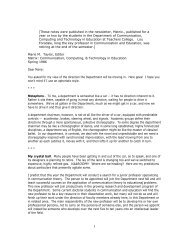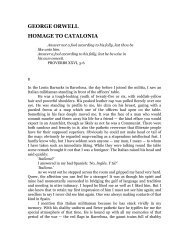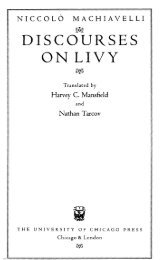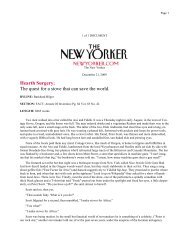THE REPUBLIC OF PLATO - Studyplace
THE REPUBLIC OF PLATO - Studyplace
THE REPUBLIC OF PLATO - Studyplace
Create successful ePaper yourself
Turn your PDF publications into a flip-book with our unique Google optimized e-Paper software.
INTRODUCTION<br />
<strong>PLATO</strong>, son of Ariston and Perictione, was born in 428/7 B.c. and<br />
died, at the age of eighty or eighty-one, in 348/7. Both parents<br />
came of distinguished families. His elder brothers, Glaucon and<br />
Adeimantus, appear as young men in the Republic. In his youth<br />
Plato became closely attached to Socrates, who by that time was<br />
wholly engaged in the mission to his fellow citizens described in<br />
the Apology.l Socrates was the one man in Athens who, in those<br />
distracting days of war and revolution, stood aloof from active<br />
life to inquire, with anyone who cared to talk with him, what<br />
men should live for. Under this influence Plato's thought, from<br />
first to last, was chiefly bent on the question how society could be<br />
reshaped so that man might realize the best that is in him. This<br />
is, above all, the theme of his central work, the Republic.<br />
All Plato's childhood and youth were spent under the shadow<br />
of the Peloponnesian War. The death of Pericles in 429 had<br />
marked the close of the golden age (as it must have seemed in<br />
retrospect) of fully developed democracy under the personal guidance<br />
of a disinterested statesman. Born in the year of the revolution<br />
at Corcyra and the revolt of Mitylene, Plato, as a child of<br />
twelve, had seen the Athenian fleet set sail on the disastrous expedition<br />
against Syracuse, and he was twenty-three when Athens<br />
capitulated and lost her empire to Sparta. The steps by which this<br />
empire had grown out of a defensive league of maritime states,<br />
formed after the repulse of the Persian invader at Salamis (480),<br />
are traced in the first book of Thucydides. The rule of Periclean<br />
democracy over subjects who had once been allies had not been<br />
oppressive; but the Athenians themselves, as represented by their<br />
envoys at Sparta on the eve of the war, can find no better excuse<br />
than the plea that empire was forced upon them by the three<br />
most powerful motives, ambition, fear, and interest.<br />
1 See Sir R. Livingstone's Portrait of Socrates in this series and F. M. Cornfard,<br />
Bef(}f"e and afm- Socrates, Cambridge, 1932.<br />
xv









